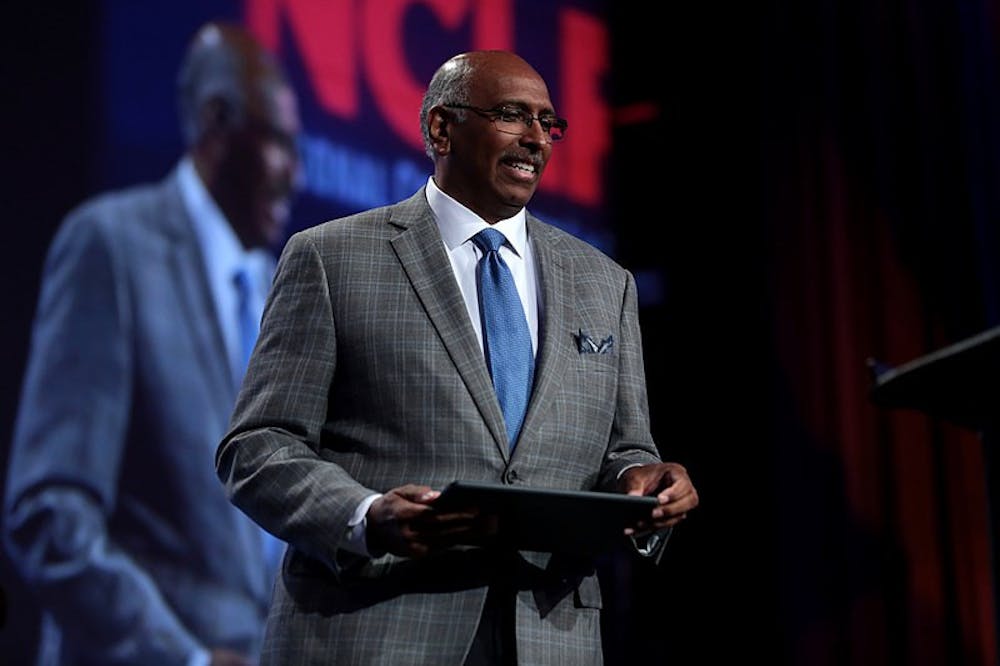Former Republican National Committee Chairman Michael Steele will join the Watson Institute for International and Public Affairs as a faculty fellow and lead a series of study groups this fall semester, the University announced in late August. Steele previously spoke at Brown before the 2016 presidential election and was a guest speaker in Democratic National Committee Chair Tom Perez’s ’83 P’18 study groups this past academic year.
Steele was RNC chairman from January 2009 to January 2011. During his term as chairman, the GOP won eight governorships and five seats in the Senate, and took control of the House of Representatives, according to Politico. His term was also marked by concern about the RNC’s finances. In recent years, Steele has emerged as an establishment Republican who has publicly criticized President Trump, according to an interview with Steele published in the Washington Post.
Steele’s study group, “The Dismantling and Rebranding of American Politics,” will focus on the “political environment that we are currently in, from the reaction that voters are having towards candidates and the respective parties, to how the parties and the political leadership themselves are responding to voters,” Steele said. Steele’s study groups will run from October through November and will include visits from guest speakers such as Jason Johnson, a professor of political science at Morgan State University and a commentator for MSNBC. Along with his group study sessions, Steele will take part in two discussions in late October and mid-November on the 2018 midterm elections. These discussions will be co-hosted by Perez, according to a University press release.
With his experience in politics, public policy, law and the media, Steele brings to the table an in-depth perspective about American politics, said Edward Steinfeld, director of the Watson Institute. Steele not only “relates very well with students, he’s excellent at being open to many different perspectives and encouraging discussion, simultaneously being willing to state his opinion but also listen to what other people are saying,” Steinfeld said.
In addition to his political credentials, Steele’s personal background as a black Republican from a largely liberal jurisdiction has also shaped his views, he said. “Even people from your own community sometimes look at you like you have three heads because you’re not of the same accepted political party as everyone else,” he said. For Steele, this experience helped form how he engages in politics. “How do you rise above it, how do you not look at that particular ugly side of politics (and let it) drag you deeper into that abyss? Rather, rise as far above it as you can to set a different tone and create a different message,” he added.
Steele’s presence comes in the midst of a continuing debate about freedom of speech and ideological diversity on college campuses. The Stephen A. Ogden Jr. ’60 Memorial Lecture’s decision to invite Jeb Bush prompted a flurry of opinions pieces in the The Herald arguing both for and against his invitation. When conservative journalist Guy Benson came to campus in February last year, 18 students writing for bluestockings magazine voiced concerns ahead of the lecture that Benson would mount an absolute defense of free speech, The Herald previously reported.
A study published last March by the SPEAK Coalition at Brown found that 94.5 percent of speakers hosted at Brown leaned left ideologically.
“Institutions like Brown, which are venerable institutions, must be … a place where intellectual debate and discussion, differing perspectives and points of view must be allowed to be heard and experienced,” Steele said.
Steele’s presence on campus doesn’t represent the University’s subscription to a particular ideology, but a commitment to a diversity of voices, Steinfeld said. “Our goal is not to promote conservative speakers per se any more than it is to promote liberal speakers, but what we do want to promote is as diverse a group of voices as possible. … Diverse in political views, diverse in experiences, diverse in gender, diverse in background,” he said. “The idea is to try to model deeply ecumenical but deeply diverse articulations,” he added.
For Caroline Deitch ’20, vice president of SPEAK, Steele’s group represents a “great step forward” in bringing a larger spectrum of ideas to campus. “The entire point of SPEAK is to run the political spectrum, to get voices from every angle, because the more voices we have, the more ideas we have, the easier it is for any individual student to understand what they’re looking for in their political lives,” she said. “What we are looking for at the end of the day is for Brown to bring in as many voices (as) possible in a safe and respectful way.”
Ultimately, Steinfeld hopes that students will see habits of “open, tolerant, spirited debate about public policy issues” modeled by Steele and all of the Watson Institute’s faculty fellows. Steele “has very strong opinions formed by years of experience in the field … but at the same time (has) this fantastic ability to listen, to respond respectfully, to encourage diverse views, to be willing to sit down with somebody who has a totally different opinion and respect that person’s knowledge, respect that person’s experience and try to come to some kind of common conclusion or at least try to learn,” he said. “This is the kind of thing that we’d like to promote. … Particularly now, given how divided not just the United States but so much of the world is.”
“What I’m hoping to get out of it is learning how this generation … look at their democracy, look at their republic, look at the nature of politics, and then learn from them what they want to do with it,” Steele said. Steele hopes that students will leave his study group with an understanding of politics that is “not necessarily as black and white as they think it is” and perhaps discover that they are “more like Donald Trump than they are willing to appreciate,” he said.





